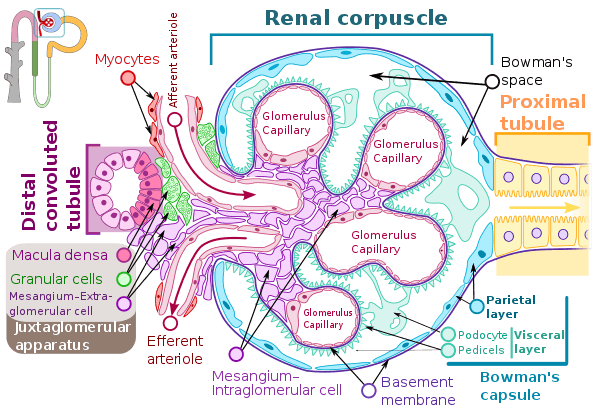Mesangial proliferative glomerulonephritis
Mesangial proliferative glomerulonephritis is a form of glomerulonephritis associated primarily with the mesangium.[1] There is some evidence that interleukin-10 may inhibit it in an animal model.[2] It is classified as type II lupus nephritis by the World Health Organization (WHO).
| Mesangial proliferative glomerulonephritis | |
|---|---|
 | |
| Renal corpuscle showing intraglomerular mesangium. | |
| Specialty | Nephrology |
Common shorthand for the condition is MesPGN.
Mechanism
Mesangial cells in the renal glomerulus use endocytosis to take up and degrade circulating immunoglobulin. This normal process stimulates mesangial cell proliferation and matrix deposition. Therefore, during times of elevated circulating immunoglobulin (i.e. lupus and IgA nephropathy) one would expect to see an increased number of mesangial cells and matrix in the glomerulus. This is characteristic of nephrotic syndromes.
Diagnosis
The clinical presentation of MesPGN is varied, although persistent or recurring microscopic or macroscopic hematuria with mild proteinuria is most common.
Studies are performed in most patients to exclude known causes. MesPGN can also be a finding in resolving postinfectious. Isolated deposits with scanty subendothelial or subepithelial (hump-like) deposits on electron microscopy may be seen in this situation indicating a likelihood of MesPGN.[3]
Treatment
Of the eleven known cases of nephrotic syndrome, three early cases went untreated. Subsequently, four were treated with steroids and four treated with steroids and cytotoxic drugs, one in each group achieved remission while the remaining patients continued to have steroid dependency or resistance. Two of these latter patients manifested steroid responsiveness, steroid resistance, and spontaneous remission at different times in their courses. Renal function remained normal in all.[4]
References
- "Definition: mesangial proliferative glomerulonephritis from Online Medical Dictionary".
- Kitching, A. R.; Katerelos, M.; Mudge, S. J.; Tipping, P. G.; Power, D. A.; Holdsworth, S. R. (2002). "Interleukin-10 inhibits experimental mesangial proliferative glomerulonephritis". Clinical & Experimental Immunology. 128 (1): 36–43. doi:10.1046/j.1365-2249.2002.01793.x. PMC 1906377. PMID 11982588.
- Glassock, Richard J. (2010). "Other Glomerular Disorders and Antiphospholipid Syndrome". Comprehensive Clinical Nephrology. pp. 335–343. doi:10.1016/B978-0-323-05876-6.00027-7. ISBN 9780323058766.
- Bhasin, H. K.; Abuelo, J. G.; Nayak, R.; Esparza, A. R. (1978). "Mesangial proliferative glomerulonephritis". Laboratory Investigation; A Journal of Technical Methods and Pathology. 39 (1): 21–9. PMID 355724.